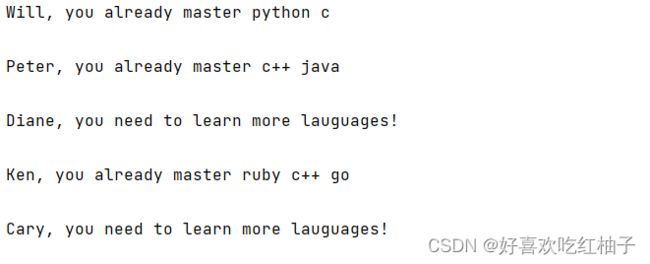Python小白学习:超级详细的字典介绍(字典的定义、存储、修改、遍历元素和嵌套)
目录
- 一、字典简介
-
- 1.1 创建字典
- 1.2 访问字典中的值
- 1.3 添加键值对
- 1.4 修改字典中的值
-
- 实例
- 1.5 删除键值对
- 1.6 由多个类似对象组成的字典
- 1.7 使用get()访问值
- 1.8 练习题
- 二、遍历字典
-
- 2.1 遍历所有键值对
-
- 实例
- 2.2 遍历字典中的所有键
- 2.3 按照特定顺序遍历字典中的所有键
- 2.4 遍历字典中的所有值
-
- 如何对输出值进行去重
- 集合
- 2.5 练习题
-
- 代码
- 输出
- 三、字典和列表的嵌套使用
-
- 3.1 在列表中存储字典
-
- 将字典手动输入列表
- 自动生成多人的字典并添加进列表
- 3.2 在字典中存储列表
-
- 输出字典中各个列表的长度
- 练习
- 3.3 在字典中存储字典
- 四、练习题
一、字典简介
字典由花括号{ }中的一系列键值对表示。
1.1 创建字典
使用一对空花括号来定义一个字典,再分别添加各个键值对。
alien = {}
alien['color'] = 'green'
alien['points'] = 5
print(alien)
1.2 访问字典中的值
字典中的元素由键值对组成,要获取与键相关联的值,可依次指定字典名和放在方括号内的键。
alien_0 = {'color':'green','points':5}
print(alien_0['color'])
print(alien_0['points'])
1.3 添加键值对
字典是一种动态结构,可以随时在其中添加键值对。如要添加键值对,可依次指定字典名、用方括号括起的键和相关联的值。
alien_0 = {'color':'green','points':5}
print(alien_0)
alien_0['x_position'] = 0
alien_0['y_position'] = 25
print(alien_0)
1.4 修改字典中的值
想要修改字典中的值,可以依次指定字典名,用方括号括起来的键,以及与该键相关联的新值。
alien_0 = {'color':'green','points':5}
print(alien_0['color'])
alien_0['color'] = 'yellow'
print(alien_0['color'])
实例
对一个能够以不同速度移动的外星人进行位置跟踪,设置外星人的移动速度有‘快、慢、中等’3个速度,快速一次向右移动3m,慢速一次向右移动1m,中等速度一次向右移动2m,现在外星人的位置为(0,25),机器人以不同的速度移动后的位置分别为多少?
alien = {'name':'alen','color':'red','x_position':0,'y_position':25,'speed':'medium'}
position = (alien['x_position'],alien['y_position'])
print(f"The position is {position}")
if alien['speed'] == 'fast':
x = 3
elif alien['speed'] == 'medium':
x = 2
elif alien['speed'] == 'slow':
x = 1
alien['x_position'] += x
new_position = (alien['x_position'],alien['y_position'])
print(f"The new position with the speed of {alien['speed']} is {new_position}")
代码中设置的是速度为medium时的位置坐标。

修改字典中speed键对应的值,可以得到不同速度的位置。

1.5 删除键值对
使用del语句删除不需要的键值对
alien = {'name':'alen','color':'red','x_position':0,'y_position':25,'speed':'fast'}
print(alien)
del alien['name']
print(alien)
1.6 由多个类似对象组成的字典
在前面的例子中,字典存储的是一个对象(alien)的多个属性,也可以用字典存储诸多对象的同种信息,如使用一个字典存储每个人最喜欢的编程语言。
favorite_lauguague = {
'ken':'python',
'jack':'c++',
'will':'java',
'mary':'ruby'
}
print(f"Will's favorite lauguague is {favorite_lauguague['will'].title()}")
在定义长字典时可以使用上面所示的多行定义。
1.7 使用get()访问值
- get(键,指定键不存在时返回的值)
该函数可以处理当想要查询的键不存在时的异常情况。
favorite_languague = {
'ken':'python',
'jack':'c++',
'will':'java',
'mary':'ruby'
}
print(favorite_languague)
languague = favorite_languague.get('diane','ERROR!No Such People Named Diane!')
print(languague)
favorite_languague['diane'] = 'c'
languague = favorite_languague.get('diane','ERROR!No Such People Named Diane!')
print(favorite_languague)
print(languague)
上述代码中:
- 使用get查询不存在的键时(diane不存在),会返回get方法中定义的发生异常时的字符串;
- 使用get查询存在的键时(为diane键赋对应的值为c),会返回该键对应的值。
1.8 练习题
print('6-1')
people = {
'first_name':'winnie',
'last_name':'ma',
'age':22,
'city':'zibo'
}
print(people)
print('6-2')
favorate_numbers={
'will':5,
'jack':10,
'diane':6,
'peter':51,
'mary':8
}
二、遍历字典
2.1 遍历所有键值对
使用for循环和items方法遍历所有键值对。
for key, value in dictionary.items( )
- 在for循环中声明两个变量key、value来代表键和值,可以使用任意变量名(如k、v等)。
- items方法返回一个键值对列表,返回的值赋给两个变量。
user_0 = {
'username' : 'jack',
'age' : 20,
'city' : 'los angeles'
}
for key,value in user_0.items():
print(key,value)
实例
打印每个人最喜欢的语言是什么,此处使用的2个变量名即与变量对应,分别为name和language.
favorite_languages = {
'jen': 'python',
'sarah': 'c',
'edward': 'ruby',
'phil': 'python',
}
for name,lauguage in favorite_languages.items():
print(f"{name.title()}'s favorate language is {lauguage.title()}.")
2.2 遍历字典中的所有键
keys( ) : 返回一个列表,该列表包含该字典中所有的键。
favorite_languages = {
'jen': 'python',
'sarah': 'c',
'edward': 'ruby',
'phil': 'python',
}
for name in favorite_languages.keys():
print(name.title())

keys()方法不仅可用来遍历,还可以用来判断键是否包含在字典中。
favorite_languages = {
'jen': 'python',
'sarah': 'c',
'edward': 'ruby',
'phil': 'python',
}
if 'will' not in favorite_languages.keys():
print('Will, please enter your name!')
2.3 按照特定顺序遍历字典中的所有键
使用sorted方法对键进行排序:sorted ( dictionary.keys( ) )
favorite_languages = {
'jen': 'python',
'sarah': 'c',
'edward': 'ruby',
'phil': 'python',
}
for name in sorted(favorite_languages.keys()):
print(f"{name.title()}, thank you!")
可以看到输出的名字都根据字母进行了排序。
2.4 遍历字典中的所有值
values( )方法返回一个值列表。
favorite_languages = {
'jen': 'python',
'sarah': 'c',
'edward': 'ruby',
'phil': 'python',
'will' : 'python'
}
for lauguage in sorted(favorite_languages.values()):
print(lauguage)

可以看到该方法输出的值中有重复项Python,想要去掉重复项则可使用set方法去重。
如何对输出值进行去重
set( ):集合,集合中的每个元素都是唯一的。
favorite_languages = {
'jen': 'python',
'sarah': 'c',
'edward': 'ruby',
'phil': 'python',
'will' : 'python'
}
for lauguage in set(favorite_languages.values()):
print(lauguage)
集合
集合和字典一样都使用花括号进行定义。当花括号内没有键值对时,定义的很可能就是集合。
lauguages = {'python','python','c'}
print(lauguages)
可以看到定义的集合中有重复元素,而集合输出会自动去重。
2.5 练习题
代码
print('6-5')
rivers_countrys = {
'nile':'egypt',
'changjiang':'china',
'amazon':'brazil'
}
for river,country in rivers_countrys.items():
print(f"The {river.title()} runs through {country.title()}.")
print('6-6')
favorite_languages = {
'jen': 'python',
'sarah': 'c',
'edward': 'ruby',
'phil': 'java',
'will' : 'python'
}
names = ['will','jen','peter','ken']
for name in names:
if name in favorite_languages.keys():
print(f"Dear {name.title()}, thank you!")
else:
print(f'Dear {name.title()}, please joy our party.')
输出
三、字典和列表的嵌套使用
3.1 在列表中存储字典
加入我们需要一个多人名单,每个人都需要包含其姓名、年龄、性别的信息,那么如何统筹管理这些多人信息呢?
答案是创建一个users列表,其中每个user都是一个字典,包含该user的各种信息。
将字典手动输入列表
user_1 = {'name':'will','age':40,'gender':'male'}
user_2 = {'name':'diane','age':37,'gender':'female'}
user_3 = {'name':'cary','age':25,'gender':'male'}
users = [user_1,user_2,user_3]
for user in users:
print(user)
自动生成多人的字典并添加进列表
若需要生成更多人的信息,则可以先创建一个users空列表,然后使用range方法生成需要的user数目。
users = []
for number in range(30):
new_user = {'name':'will','age':40,'gender':'male'}
users.append(new_user)
#显示前5个
for user in users[:5]:
print(user)
使用range(30)自动生成30个user字典,然后依次使用append方法添加进users列表中。
下图显示输出前users列表中的前五个user字典。
3.2 在字典中存储列表
假如想要建立人们所掌握的编程语言的字典,每个人可能掌握多种编程语言,所以就需要一个键对应多个值,此时可以在字典中嵌套列表。
people_lauguages = {
'will' : ['python','c'],
'peter' : ['c++','java'],
'ken' : ['ruby','c++','go']
}
for people,lauguages in people_lauguages.items():
print(f"{people.title()} can master:",end=" ")
for lauguage in lauguages:
print(lauguage.title(),end=" ")
else:
print("\n")
输出字典中各个列表的长度
使用values方法来获取字典中的列表,然后使用len方法统计列表长度。
people_lauguages = {
'will' : ['python','c'],
'peter' : ['c++','java'],
'diane' : ['python'],
'ken' : ['ruby','c++','go'],
'cary' : ['c']
}
for lauguages in people_lauguages.values():
print(len(lauguages))
练习
假如需要进一步对人们掌握的语言个数进行判断,若只能掌握一种语言,则输出“你需要继续加油学习”语句。
people_lauguages = {
'will' : ['python','c'],
'peter' : ['c++','java'],
'diane' : ['python'],
'ken' : ['ruby','c++','go'],
'cary' : ['c']
}
for people,lauguages in people_lauguages.items():
if len(lauguages) == 1:
print(f"{people.title()}, you need to learn more lauguages!",end=" ")
elif len(lauguages) >=2:
print(f"{people.title()}, you already master",end=" ")
for lauguage in lauguages:
print(lauguage,end=" ")
else:
print("error!")
print("\n")
3.3 在字典中存储字典
字典中嵌套了相同结构的字典。
users = {
'mary' : {
'age':21,
'gender':'female'
},
'will' : {
'age':40,
'gender':'male'
}
}
for name, name_info in users.items():
print(f"{name}")
for age,gender in name_info.items():
print(age,gender)
四、练习题
#6-7
people_1 = {
'first_name':'winnie',
'last_name':'ma',
'age':22,
'city':'zibo'
}
people_2 = {
'first_name':'will',
'last_name':'zhao',
'age':40,
'city':'qingdao'
}
people_3 = {
'first_name':'mary',
'last_name':'wang',
'age':20,
'city':'jinan'
}
people = [people_3,people_2,people_1]
for p in people:
for k,v in p.items():
print(k,v)
6-9
#6-9
favorate_place = {
'peter' : ['america'],
'cary' : ['china','brazil','italy'],
'diane' : ['india','france']
}
for name,places in favorate_place.items():
if len(places) == 1:
print(f"{name.title()}'s avorate place is {places[0].title()}!")
elif len(places)>=2:
print(f"{name.title()}'s favorate places are",end=" ")
i=1
for place in places:
if i<=len(places)-1:
print(f"{place.title()}",end=" and ")
i+=1
else:
print(f"{place.title()}",end="!\n")
else:
print("error")
6-11
#6-11
cities = {
'zibo':{
'country':'china',
'num_people':9000,
'food':'barbecue'
},
'jinan':{
'country':'china',
'num_people':500,
'food':'meet'
},
'qingdao':{
'country':'china',
'num_people':6300,
'food':'sea food'
}
}
for city,city_info in cities.items():
print(f"{city.title()}")
for k,v in city_info.items():
print(k,v)





















